Ollie
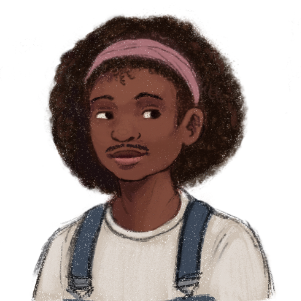
- He/him
- Good with computers, even though that's uncommon
- Lives with Nathanyl, spends a lot of time trying to figure out how to work on his memory
- Has a cat named Gabriel
My art:
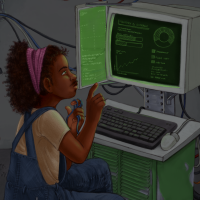
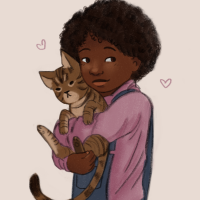
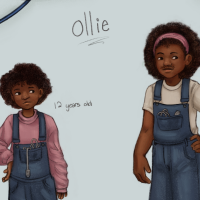
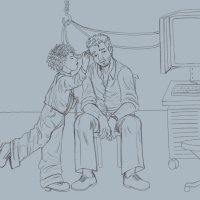
Others' art:

Expanded Lore
Ollie was born to a poor family with dreams of moving up the social ladder at any cost. When his parents got their big break, finally coming into the sort of money they’d always wanted, they wanted a fresh start. They moved to a nicer neighborhood and neglected to bring their son with them.
He survived on money still being sent to their old address, a recurring check so small that his parents would never miss it now. It was enough for him to keep himself fed while squatting in an old building nobody else was using. For a while, he lived alone with his cat, Gabriel. From there, he hauled home old computers and other technology that people had thrown out, and spent his time learning how it worked by trial and error.
His cat had a habit of escaping and running off, and once when Ollie was out searching for him he found him with Nathanyl, a man who had been sleeping in an alleyway nearby. He was clearly unwell, and Ollie insisted on bringing him back home where he could sleep out of the cold. When Nathanyl saw his salvaged computer, he got excited, because he needed someone who knew how to use one. It was the first opportunity Ollie had ever had to use it for what it was meant to do. So he hooked him up to the computer as best he knew how, and managed to run a basic scan without any major problems.
Figuring out how to do anything with those scans took time — slowed down by the fact that Nathanyl’s faulty synthetic memory bank reset every couple of weeks, forcing Ollie to talk him back into staying again and again — but eventually they got there. Errors he’d accumulated over the years were fixed, and together they learned how to extend the time he had, bit by bit, until they reached the limit of what the hardware in his head could accomplish.
Once they’d reached that point, Ollie knew enough to start writing a program of his own. Something that could really make things work out better, maybe even let him retain some information long term. And it worked. The two of them continued to live together and work together for years, with Ollie taking care of the technological aspects, and Nathanyl teaching Ollie all of the things that his parents had neglected to prepare him for. The two were inseparable.
Nathanyl
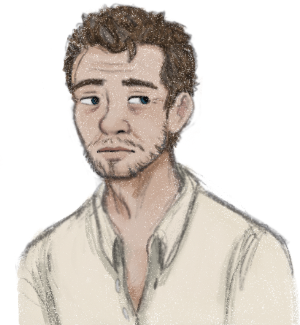
- He/him
- Has a synthetic memory bank that doesn't quite work right
- Born rich but spent a decade homeless
- Living with Ollie, the only person he knows who can work on his memory
My art:

Expanded Lore
Nathanyl was born to a wealthy family in a particularly controlling and conservative society. Like most in his community, his life was planned out extensively from birth in order to give his family the best possible social standing they could afford. Unfortunately for his parents, he was difficult to keep compliant.
From a young age, Nathanyl was “troubled” with visions and compulsions, which he struggled to explain to others. He was constantly daydreaming, lost in thought about a future which hardly lined up with what was expected of him. His parents believed he would grow out of this with time and appropriate punishment, but nothing they did made much of a dent.
He was engaged to marry Melanie, a girl his parents had chosen for him. The two of them got along, and their courtship went smoothly in all of the societally expected ways. His parents had hoped that she would put a stop to some of his more out there behavior, but she was too kind to control him in that way.
When Nathanyl failed to improve by their metrics, his parents began to float the idea of “quieting him down” with what was essentially a lobotomy — a surgery meant to disconnect the parts of his brain responsible for his more socially difficult symptoms. When he declined, they turned to Melanie. With her consent, they could have forced the issue. All she had to do was agree that he was not mentally well enough to need intervention against his will, but she refused.
When he was in his late 20s, his mental state took a sharp and sudden drop. His more worrying symptoms increased, until even his fiancee began to get frustrated with him. At their limit, his parents kidnapped him and lied to Melanie, claiming he’d been in a serious accident and needed the surgery in order to live. They convinced her to sign the consent forms for the brain surgery they’d both been so against. It went poorly.
Nathanyl ended with damage to his short term memory, which required follow up surgeries to implant a synthetic memory bank that could interface with his brain. The complications from that surgery led to nerve damage, which led to a surgery to replace some of the nerves on the right side of his body, and his needing synthetic skin on his right hand and forearm. The complications were considered rare, but he hadn’t wanted any of the surgeries in the first place, which made his frustration worse.
From that point on, his memory had to be maintained with a medical computer, complex technology that Melanie put patient work into learning. Neither of them had ever owned a real computer, and picking it up took time. If they worked at it on a regular basis — daily, or nearly — then his memory functioned almost as usual. The complications aside, the rest of the surgery worked almost as intended. He could still remember, distantly, the sorts of thoughts that used to bother him. He just no longer had the willpower or emotional connection necessary to care.
When his parents began suggesting further surgeries to give him more aesthetically pleasing results, he finally snapped. He took everything he could fit into a backpack and ran. His parents, rather than look for him, quickly cut their losses. They announced that he’d died of surgical complications, leaving him legally dead and unable to access anything in his own name.
Nathanyl spent the next decade wandering, legally nonexistent, and homeless. Without the help of the software his memory bank was meant to interface with, the storage would overflow and trigger a complete memory flush every week or two. Nothing since the surgery could be held onto for long. Unfortunately, medical computers were both rare and expensive, so these resets became an inevitability. He did his best to adjust, making lists for himself of everything he needed to retain. He managed to make money off of skills he’d learned from his upper class childhood, and kept himself as presentable as he could manage. That was enough to get by.
Things changed when he was found. One day, after falling asleep in a relatively hidden alley, he woke up to a cat standing on his chest and demanding his attention. A preteen boy showed up soon after, in search of the cat, and insisted that Nathanyl come home with him out of the cold. He tried to argue, but he was so exhausted and disoriented by a recent reset that he gave in quickly. The boy, Ollie, took him back to the place where he and the cat lived alone.
By some sort of miracle, Ollie had salvaged a medical computer of his own. It was old enough that it would’ve been nearly out of date when he was born, but it worked. They didn’t have the software necessary to actually interface with his memory bank correctly, but every medical computer had the software necessary to read it in a basic way. They could run the sort of basic diagnostics he’d been struggling to access for years. Between that and the realization that Ollie was completely on his own, he had to stay. Even if he could survive alone, he couldn’t bring himself to leave a kid so young on his own.
His memory continued to reset every week or two, but the two of them worked together to puzzle out how his head worked. Meanwhile, Nathanyl tried to teach Ollie the sorts of things he’d learned growing up that his parents had neglected to teach him. It took years for them to optimize things enough to extend his memory, and in the end it meant Ollie had to all but reverse engineer the old software himself, but he successfully did it.
The two of them were practically inseparable, and they continued to live and work together for the rest of Nathanyl’s life, until his medical complications caught up with him.
Melanie

- She/her
- Nathanyl's ex-fiancee
- Wealthy, but under the control of her parents
Expanded Lore
Melanie was born into a wealthy family, with every aspect of her life planned in advance. She was arranged to marry Nathanyl, something they were both aware of from a young age. She was fond of him, despite his social missteps and the his difficulty complying with what was expected of them. Their early engagement went smoothly, until their parents started to interfere.
Nathanyl’s parents were concerned with his health, because he believed things that didn’t make sense and acted on them in ways that sometimes put him in danger. But the surgery they suggested for him was dangerous, and it could change his personality, and she saw the way it scared him. So she stood with him against his parents, determined to help him on her own. For a while, this worked.
Before their marriage was actually scheduled to take place, Nathanyl’s mental health took a sharp turn for the worse. His parents told her that he’d been in a terrible accident, something to do with his reckless behavior, and as his fiancee they needed her consent to get him into the emergency surgery he needed. She signed, not realizing it was actually the brain surgery they’d argued against before. Unfortunately, it went poorly.
After the surgery, there were complications. And then more complications, and more surgeries, and medical technology she had to learn to use to take care of him. His memory wasn’t the best even when it all worked out correctly, and his frustration about this was evident. She tried to help, but he just kept getting worse.
She didn’t even know he’d been taken in for another surgery until his parents called her, to tell her that he hadn’t survived. She had no reason not to believe them, and the grief was too much for her. She was expected to move on, but the two of them had been promised to each other since they were young. She didn’t want anyone else.
When she couldn’t get over what happened, her family caved to societal pressure. Surgical intervention kept her from feeling her grief so strongly, kept her mild enough to do what was expected of her. Even if she never fully moved on.



